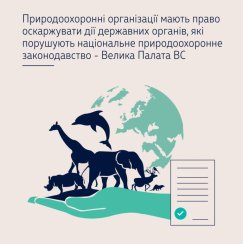Contact center of the Ukrainian Judiciary 044 207-35-46

The Grand Chamber of the Supreme Court in its Resolution of 11 December 2018 in the case No. 910/8122/17 concluded that an environmental organization (charity, civil organization) shall be authorized to represent society’s environmental interests and its separate members in court in order to protect human and citizen violated environmental rights or in order to remedy the violations of environmental law.
The dispute with economic entity on the prohibition of the activity of its dolphinarium under the claim of a charity organization (the aim of its foundation is represented by providing individuals and legal entities with assistance in the protection of their environmental rights and the protection of environment in the public interest) motivated by the UNECE Convention on Access to Information, Public Participation in Decision-making and Access to Justice in Environmental Matters (Aarhus Convention) is administrative one.
By submitting such a claim to court, in fact, the environmental organization exercises the authority of public administration bodies, which shall perform control over the compliance with legislative requirements as for the protection of animal welfare by economic entities.
Thus, pursuant to the Aarhus Convention, public representatives shall have right to appeal against the violations of the national environmental law irrespectively on the fact, whether such violations refer to the rights to information and the public participation in decision-making guaranteed by the Aarhus Convention, or not. After all, this Convention ensures the access to justice on the grounds of authoritative powers, as well as in the order of ensuring the compliance with the national environmental law.
Prescriptions of legal and regulatory acts at all levels as for the principles, rules, requirements, obligations of different entities, which deal with keeping wild animals, at all titles (in all forms of ownership or use), in captivity or in semi-open regime, shall be the “national law relating to the environment”, within the meaning of item 3 of Article 9 of the Aarhus Convention. The violation of the prescriptions of these legal and regulatory acts may be the subject of judicial appeal, pursuant to Article 9 of the Aarhus Convention.
Everyone shall have right to protect violated constitutional right to safe environment; it may be realized personally, as well as by means of the participation of a member of public; in this case it is represented by ICO “Environment-People-Law” (EPL). Therefore, the EPL, in fact, exercises the authority of public administration bodies, which shall perform control over the compliance with legislative requirements as for the protection of animal welfare by economic entities, while submitting a claim to court on the remedy of violations as for using wild live animals committed by the defendant.
The Grand Chamber of the Supreme Court considers that ICO “Environment-People-Law” shall be authorized to apply to court in order to remedy the violations of environmental law committed by the defendant. At the same time, since by means of submitting such a claim the claimant, in fact, replaces the public administration body in terms of performing control over the compliance with environmental law, this dispute has public order nature; therefore, it shall be solved in the order of administrative, but not commercial judicial proceedings.
Follow the link http://reyestr.court.gov.ua/Review/78977479 to see the text of the resolution.